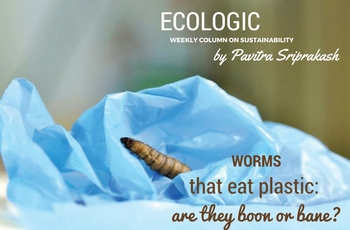06 May 2017, New Indian Express: ECOLOGIC- Pavitra Sriprakash, the Chief Designer and Director of Shilpa Architects writes about the bane of plastics.
Read More: Link to New Indian Express Site | PDF | Full Text (below)
Full Article:
Worms that eat plastic: are they boon or bane?
Last week the world was abuzz about ‘plastic eating caterpillars.’ Plastics are convenient and indispensable but they litter Mount Everest. Its derivative and polychlorinated biphenyls have been traced in the Pacific Ocean at Mariana Trench at levels that match the most polluted river Liao in China. That’s why plastic eating wax worms seem like god’s gift to humanity.
The galleria mellonella (wax worm), is a fast eating caterpillar which is known as either a fish bait or a parasitic pest that feeds on beeswax. An amateur beekeeper noticed that wax worms bore through polythene bags and other non-biodegradable materials and escaped. Curious researchers from the Institute of Biomedicine and Biotechnology of Cantabria and the University of Cambridge conducted an experiment using 100 wax worms. Within 40 minutes, holes began to appear and 12 hours, the mass of the plastic bag was 92 milligrams less!
This chance discovery makes us marvel at nature. The process of assimilation and the enzymes that break polyethylene are under study. But there could be bad consequences to increasing wax worms artificially. How will their exploding subterranean populations in landfills impact honey production or pollination? What if they secrete toxins during the clean up?
Scientists could well be racing to unravel the secrets and isolate the molecules, which dismantle the chemical structure of polymers. If successful, advances in biotechnology would neutralize impossible deleterious in days what would take nature a millennium. It is wild speculation now, and to crack the actual science, we may take years of R&D followed by field trials and rigorous government scrutiny. If only all environmental Armageddons had neat solutions waiting to be discovered, then foolish human daredevilry could be tolerated. Has humanity dodged a bullet?!
Technologies that drive cyclical economies with negligible negative consequences are magical especially if they can correct nonchalant degradation of natural ecosystems, biomes and processes. In just 12,000 years, humans have irreversibly interfered with the natural balance of our five billion-year-old earth. For 400 years, fossil fuels have powered industrial revolutions and lifted billions out of poverty.
Worryingly carbon levels in the atmosphere have gradually risen beyond the allowable 400 parts per million. While more trees would soak more carbon dioxide, the better measure would be to check and reduce carbon footprints. The focus needs to shift from firefighting to reducing or eliminating activities that cause infernos.
If bees were to accidentally disappear because experiments with wax worms went horribly wrong, humans could become extinct in four years! So it isn’t okay to be sanguine that worms will someday eat up all our plastic wastes. Make a modest contribution to living sustainably now. Refrain from using plastic bags. That pledge alone would make a world of difference. It is time you gave back to our planet.



